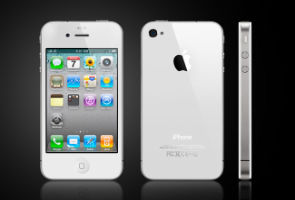- Home
- Mobiles
- Mobiles News
- Apple's rivals swoop into China as new iPhone learns Mandarin
Apple's rivals swoop into China as new iPhone learns Mandarin

Apple's sales from greater China, which includes Taiwan and Hong Kong, totalled $5.7 billion for its third quarter ended June, an unexpectedly steep drop of $2.2 billion from the January-March period in its second-largest market.
Tim Cook, Apple's chief executive, told analysts that about half of the quarter-to-quarter decline stemmed from "changes in the inventory channel" rather than weak sales of its iPhone 4S, which analysts took to mean that Apple had built up excess inventory in the first three months of the year.
That extra inventory meant resellers did not need to buy as many iPhones in the April-June period. The iPhone 5 is widely expected to be released in October, which likely contributed to resellers' slower orders of the 4S.
Cook also pointed out that iPhone 4S sales were very strong in China over the first three months of this year, so there was probably some drop-off in demand after that period.
But some analysts noted that competitors such as Samsung Electronics Co Ltd and HTC Corp had recently launched well-received new products, and questioned whether the iPhone was losing its status as the must-have accessory for China's hip and rich.
"The (iPhone 4S) model is a little bit too long in the tooth when compared to other phones with better specs," said TZ Chuang, a Beijing-based analyst from research firm IDC.
"To put it plainly, consumers are getting a little bit tired of the look of the iPhone 4 and the iPhone 4S."
Siri learns Mandarin
Consumers in China, which has the world's largest number of mobile subscribers, were spoilt for choice with a slew of new phones available over the past few months.
Samsung, which pre-announced a record quarterly profit of $5.9 billion earlier this month, saw stronger-than-expected demand for its latest Galaxy S III model, while HTC's One X also gained popularity among phone users globally, including the greaterChina region.
"The S III and One X are outselling the iPhone now because people like their wider screens, better cameras and the apps are pretty good," said a salesperson at an electronics store in Hong Kong that carries phones from Apple, Samsung, HTC and Nokia Oyj .
New smartphones made by China's Huawei Technologies Co Ltd, ZTE Corp and Xiaomi were also hot sells, in part because the price was right. They are heavily subsidised by China's three telecom carriers.
Apple is expected to release its next iPhone around October, according to sources, about a year after the launch of the 4S, which was a hot seller in the first three months of 2012 and helped to drive Apple's stellar earnings in that period.
There was one hitch for Chinese consumers, however: Siri, the voice-activated personal assistant programme that was a popular selling point globally for the 4S, doesn't speak Mandarin or Cantonese, which are widely spoken in mainland Chinaand Hong Kong.
The iPhone 5 version of Siri will have those language skills, according to sales staff in an Apple store in Shanghai's Pudong financial district, which a Reuters reporter visited on Wednesday. That is one more reason for Chinese customers to hold off until the new phone is available.
"Since iPhone 5 will come out soon, operators don't want to buy in any more iPhone 4S as they will add to the inventory," said Ming Chi Kuo, an analyst from KGI Securities.Copyright Thomson Reuters 2012
For the latest tech news and reviews, follow Gadgets 360 on X, Facebook, WhatsApp, Threads and Google News. For the latest videos on gadgets and tech, subscribe to our YouTube channel. If you want to know everything about top influencers, follow our in-house Who'sThat360 on Instagram and YouTube.
Related Stories
- Samsung Galaxy Unpacked 2025
- ChatGPT
- Redmi Note 14 Pro+
- iPhone 16
- Apple Vision Pro
- Oneplus 12
- OnePlus Nord CE 3 Lite 5G
- iPhone 13
- Xiaomi 14 Pro
- Oppo Find N3
- Tecno Spark Go (2023)
- Realme V30
- Best Phones Under 25000
- Samsung Galaxy S24 Series
- Cryptocurrency
- iQoo 12
- Samsung Galaxy S24 Ultra
- Giottus
- Samsung Galaxy Z Flip 5
- Apple 'Scary Fast'
- Housefull 5
- GoPro Hero 12 Black Review
- Invincible Season 2
- JioGlass
- HD Ready TV
- Laptop Under 50000
- Smartwatch Under 10000
- Latest Mobile Phones
- Compare Phones
- Moto G15 Power
- Moto G15
- Realme 14x 5G
- Poco M7 Pro 5G
- Poco C75 5G
- Vivo Y300 (China)
- HMD Arc
- Lava Blaze Duo 5G
- Asus Zenbook S 14
- MacBook Pro 16-inch (M4 Max, 2024)
- Honor Pad V9
- Tecno Megapad 11
- Redmi Watch 5
- Huawei Watch Ultimate Design
- Sony 65 Inches Ultra HD (4K) LED Smart TV (KD-65X74L)
- TCL 55 Inches Ultra HD (4K) LED Smart TV (55C61B)
- Sony PlayStation 5 Pro
- Sony PlayStation 5 Slim Digital Edition
- Blue Star 1.5 Ton 3 Star Inverter Split AC (IC318DNUHC)
- Blue Star 1.5 Ton 3 Star Inverter Split AC (IA318VKU)

















